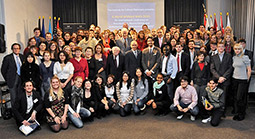The Ankara Conference on Peacebuilding & Conflict Resolution
"Using Cultural Diplomacy as a Tool to Build Sustainable Peace"

A World without Walls 2009
"Soft Power", CD & Interdependence
A World without Walls 2010
Peacebuilding, Reconciliation & Globalization in an Interdependent World
A World without Walls 2011
Promoting Peace and Stability in the Mediterranean

Conference Agenda
Culture can have a strong impact on societies, and should be taken into account as a factor in change and new developments in the national as well as international systems. In the context of the Arab Spring, many nations in the Mediterranean region are reviewing different models for how culture and politics can be balanced in order to enable peace building and conflict resolution. Since the model of Turkey is often reviewed in these discussions and debates, Ankara will serve as a fascinating context for this conference.The conference therefore will look in detail at the major conflicts and transitions taking place across the Mediterranean today (and since the beginning of the Arab Spring), from disputes amongst communities at the local level to international disputes, reflecting on the role of cultural diplomacy as a tool for conflict resolution.
Through constructive discussion and debate the conference will assess the changing national and global environments as well as explore how non-governmental organizations, governments, and individual stakeholders can support peace building, reconciliation, and conflict de-escalation across the world. In particular we will analyze innovative and new strategies for cultural diplomacy that respond specifically to the unique historical settings and contexts in different parts of the Mediterranean.
The Following Issues will be explored and discussed:
The Mediterranean as a Multifaceted Security Challenge: Peacekeeping Operations and Security Balance
- Assessing the legitimacy and efficiency of peacemaking interventions
(Focus: interventions in Lebanon, Libya, Syria; security cooperation with international organisations (AU)) - Preventing conflict through the non-proliferation of deadly weapons
(Focus: small and light weapons (SALW); arms trade; anti-nuclear proliferation) - Hot spots and new threats to the regional balance
(Focus: Al-Qaeda in the Islamic Maghreb; Israel-Palestine; Cyprus) - Can international law prevent conflict?
(Focus: the legitimacy of Public International Law; Responsibility to Protect (R2P); sovereignty as a challenge to peace)
Reconciling Conflict in Societies through Intercultural Dialogue
- Linking territory and identity
(Focus: transnational threats; Western Sahara and the Israel-Palestine conflict; border issues) - The rise of civil society
(Focus: the Barcelona process and the Anna Lindh foundation; internet revolutions) - Migration: a tool for better understanding within the region?
(Focus: Refugees; migration from former colonies; European borders and zone of influence) - Fostering religious understanding
(Focus: the rise of populism in Europe; modernisation of Islamic societies)
Building Sustainable Institutions to avoid Future Conflict
- Democratization and the challenges of the Arab Spring
(Focus: institution-building; multipartism; rule of law) - Preserving human rights
(Focus: freedom of expression; cultural specificity of human rights; minority issues) - External assistance to democratization efforts
(Focus : Institutional cooperation (EU, OECD, OSCE, UN); democratization through intervention (Iraq, Libya)) - Development aid as a tool for interfering with national affairs
(Focus: conditionality of aid; western bias in the development industry)
Integration of the Mediterranean Region into the Global Arena
- The rise of new regional powers
(Focus: Turkey as a new global power; South-South cooperation) - A balanced relationship with the EU?
(Focus: from Barcelona to the Union for the Mediterranean; discrepancies within the European Neighboring Policy) - The Environment as a resource and a challenge
(Focus: Oil, water, and rare resources as causes for conflict; climate change; Desertec project) - Peace through trade?
(Focus: the WTO and global norms; free trade agreements)






































































